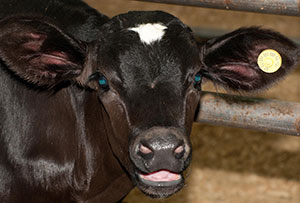Healthy Calf Conference
Follow to stay up-to-date on all Healthy Calf Conference updates. Speaker announcements, sponsorship information, registration announcements, and more.
Antimicrobial treatments like antibiotics are an important tool for raising healthy calves. Irresponsible use of these medications is increasingly scrutinized by consumers, media, and regulators, and can have negative impacts on food safety and human health as well as consumer perceptions of dairy farming.
Since not all calves go to a veal barn for finishing – some can go from an auction barn straight to processing -, dairy producers in particular have a key role to play when it comes to ensuring food safety through responsible antimicrobial use in bob calves.

In Ontario, all light calf carcasses (up to 176 pounds) are tested for residues under the provincial Antimicrobial Surveillance program. If a carcass tests positive, it is condemned and the Canadian Food Inspection Agency will use the animal’s ID tag to trace that carcass back to its farm of origin, issue a violation letter and follow up with a visit to that farm.
More than a dozen drug residues are commonly found in light calves – about half are from scour pills and approximately one third come from antibiotics with very long withdrawal times.
Modern testing equipment is extremely sensitive and can detect residue levels of up to one billionth or even one trillionth of a gram of tissue or plasma. If you follow label directions and indications correctly, only one in 1,000 animals will have residues that exceed the allowable limits. When in doubt, contact your veterinarian.
Responsible shipping of any animals off the farm is critical to ensuring food safety and maintaining consumer trust and confidence in Canadian farmers and Canadian food.
As a dairy producer, here is what you can do to prevent antibiotic residues in your calves:
Before shipping:
Any comments or questions about Calfcare’s e-News? Just drop a line to info@159.89.120.83.
Calfcare’s e-Newsletter delivers the latest information and ideas to help you improve the way calves are raised on your farm.
Follow to stay up-to-date on all Healthy Calf Conference updates. Speaker announcements, sponsorship information, registration announcements, and more.
The Codes of Practice are nationally developed guidelines for the care and handling of farm animals. They serve as our national understanding of animal care requirements and recommended practices.